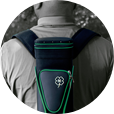How to Choose the Best Pool Stick Cases: 8 Things to Consider

You've invested in a pool cue that's become a prized possession – now it's time to look into pool stick cases to give your cue the protection it deserves. Ensuring its safety during storage and transport preserves your pool stick's longevity and ensures optimal performance. However, with so many options available, finding the perfect pool stick carrying case can be daunting. Fear not! In this article, we'll share eight of the most important things to consider when purchasing pool cue cases .
1. Material & Durability
One of the foremost considerations when selecting a pool cue carrying case is the material from which it's crafted. The material dictates the case's appearance, durability, longevity and the level of protection it offers to your pool cues. Let's discuss popular materials and their key attributes:
Leather
- Pros: Timeless and elegant, leather offers a premium look and feel. With proper care, leather can age gracefully, developing a unique patina over time. There are many benefits of leather – it provides a good balance between protection and aesthetics.
- Cons: Leather pool stick cases are higher maintenance, susceptible to scratches and require occasional conditioning. Leather is also more expensive than other materials.
Vinyl
- Pros: More affordable than leather while offering a similar aesthetic, vinyl is easier to clean and maintain. It's resistant to water and other spills.
- Cons: A vinyl pool cue carrying case is less durable than genuine leather – and may look and feel less appealing.
Nylon
- Pros: Nylon pool stick cases are lightweight and highly durable. They're moisture-resistant and ideal for regions with high humidity or frequent rain. Because it's designed for rugged use, a nylon pool cue carrying case is a great choice for players on the move.
- Cons: Aesthetically, nylon may not be everyone's first choice. A nylon pool cue carrying case has a sportier, more casual look than the classic appearance of leather or vinyl.
Inner Lining
Regardless of the external material, your pool stick case's inner lining is crucial. It's the first line of defense against scratches, dents or other damage to your cue.
- Felt or soft cloth lining: Offers a gentle touch to the cue, preventing any scratches.
- Foam padding: Provides shock absorption, ensuring minor falls or bumps won't lead to significant damage.
Pro Tip: While the external material is essential for the case's appearance and initial protective qualities, the interior contributes significantly to its protective function. Ensure that your chosen pool stick carrying case offers robust protection from the outside and a soft, cushioned environment inside to keep your pool cues in prime condition.
2. Size & Capacity
When it comes to pool stick cases, size matters – but not just in terms of physical dimensions. The case's capacity to securely hold cues, extra shafts and other accessories is pivotal. It's essential to ensure your gear fits comfortably without being overly cramped or excessively loose. Here's what you should consider:
Single Cue Cases
- Best For: The casual player or someone just starting out.
- Pros: A single pool stick carrying case is lightweight and highly portable. Its simplicity means it's more affordable.
- Cons: With limited space, single pool stick cases can't accommodate extra shafts or multiple cues.
Double Cue Cases
- Best For: Anyone with a playing cue and a separate break/jump cue.
- Pros: Offers separate compartments, ensuring pool cues don't rub against each other. A double pool cue carrying case has additional pockets for chalk and other small pool cue accessories.
- Cons: Slightly bulkier than single cue cases.
Multiple Cue Cases
- Best For: Serious players, collectors or professionals who need an assortment of cues for various games and purposes.
- Pros: Accommodates three or more cues easily. A multiple pool cue carrying case is kitted with accessory pockets and compartments.
- Cons: Can be significantly bulkier and heavier, impacting portability.
Pro Tip: The size and capacity of your pool stick case should align with your current collection and future plans. While it's crucial to have a snug fit for protection, a bit of extra space is beneficial for storage and ease of access. Always prioritize the safety of your cues and select a pool stick carrying case that ensures your cues remain safe and secure during transport and storage.
3. Design & Aesthetics
Your pool cue carrying case is more than a protective tool; it reflects your personality, style and passion for the game. While the primary goal of a case is to safeguard your cues, its design and aesthetics are also paramount, especially for players who want to make a statement even before they play their first shot. Let's talk about the elements of design and aesthetics to consider.
Traditional vs. Modern Designs
- Traditional: Often made of leather or vinyl, these types of cue cases boast classic designs reminiscent of old-school billiards rooms with rich colors, brass accents and intricate stitch patterns.
- Modern: These unique pool cue cases feature sleeker lines and bolder colors, often incorporating high-tech materials or features. They're more about functionality merged with contemporary aesthetics.
Color Choices
From the timeless elegance of black or brown to vibrant reds, blues or even patterned designs, the color of your pool cue carrying case can be a personal statement. Some players prefer neutral tones for a professional look, while others opt for brighter shades for a more playful vibe.
Customization
Many manufacturers offer custom pool cue cases with options such as monogramming, embroidered logos or custom colors and patterns. For those wanting a truly unique case, customization can be the key.
Pro Tip: Your pool stick carrying case, much like your cues, is an extension of your identity as a player. While aesthetics are subjective and personal, prioritize a harmonious balance between style and substance. Remember that a well-chosen pool cue carrying case not only safeguards your equipment but also complements your style, making you feel confident and ready for the game ahead.

4. Protection Level
The primary function of pool stick cases is to protect your cues. Whether you're transporting them to a local pool hall or across the country for a tournament, ensuring they remain in prime condition is paramount. Here's what to consider when assessing the protection level of a cue case:
Hard Cases vs. Soft Cases
Hard Cases
- Pros: Hard pool cue cases offer maximum protection against external forces such as impacts and falls. They're typically made of hard plastic, metal or reinforced leather to shield your cues from bending or breaking. Hard cases are Ideal for frequent travelers or those who play in various locations.
- Cons: They're heavier and bulkier, making them slightly less convenient for short trips.
Soft Cases
- Pros: A soft pool stick carrying case is lightweight and more flexible, making it ideal for quick trips or casual play. Often made of nylon, canvas or non-reinforced leather, it's easier to store when not in use.
- Cons: Soft pool stick cases provide less protection against hard impacts or accidental drops.
Internal Padding
Essential for both hard and soft cases, internal padding cradles the cue, preventing it from moving inside the case. Look for cases with molded interiors or thick foam padding that conforms to the shape of the cue, ensuring a snug fit.
Reinforced Corners and Edges
Corners and edges are particularly vulnerable to impacts. Cases with reinforced corners offer extra protection against accidental bumps.
Pro Tip: A cue is an investment, and like any investment, it requires protection. When selecting a pool cue carrying case, it's crucial to evaluate the environments and situations in which you'll use and transport your cues.
5. Portability
Whether you're a casual player heading to a friend's house or a professional traveling for tournaments, the ease of transporting your cue case is crucial. A cumbersome or awkward case can make your journeys less pleasant, so considering portability is key. Here are factors to keep in mind:
Weight
Empty vs. Full: Gauge the weight based on how heavy it becomes once it's loaded with cues and accessories. Lighter cases are naturally more portable, but ensure they don't compromise on protection.
Carrying Options
- Handles: Look for pool stick cases with ergonomically designed handles that offer a comfortable grip, especially if carrying your case for extended periods.
- Shoulder Straps: These can distribute the weight more evenly, reducing strain. Adjustable straps can help in positioning the case to your comfort.
- Backpack Straps: Ideal for those who prefer hands-free carrying or have longer distances to cover, cue cases with backpack straps are the perfect solution. This style is becoming more popular, especially for larger cue cases.
Compactness
- Design: A streamlined design without bulk makes a difference, especially in crowded places or when you have limited storage space during travel.
- Length: Ensure your pool cue carrying case isn't excessively long unless required for specific cues. A compact case is more maneuverable through doors, hallways and other tight spaces.
Storage
When not in use, how easily can the case be stored? Does it retain its shape when empty, or can it be collapsed or folded? These are factors to consider if you have limited storage space.
Pro Tip: Portability merges convenience with function. While a pool stick case's primary role is to protect, its design should also align with your lifestyle and travel habits. By ensuring your case is as easy to carry as it is protective, you can focus more on your game and less on the logistics of getting there.
6. Accessibility & Functionality
A good pool stick carrying case not only guards your cues but also ensures you can access and use them with minimal fuss. The interplay between accessibility and functionality is pivotal in providing a hassle-free experience. Here's what to consider:
Zipper Quality and Design
Opt for cases with high-quality zippers that can withstand frequent use. Zippers should glide smoothly without catching or sticking. A jammed zipper can delay your game and even risk damaging your cue when trying to force it open. In addition, zippers placed in easy-to-reach areas ensure quick access.
Compartments, Pockets & Hooks
Cases should have specific compartments for cues and shafts plus smaller pockets for accessories like chalk, tip shapers and pool gloves. Organized storage protects items from rubbing against each other and simplifies access. For items you need to grab quickly, like gloves or cleaning cloths, having external hooks or loops can be clutch.
Easy Cue Retrieval
The interior should be designed to allow cues and shafts to slide out smoothly. This often means having a soft lining and slightly wider openings, ensuring you don't have to wrestle your equipment in or out.
Pro Tip: Ease of use is what truly differentiates good pool stick cases from great ones. It's the little design elements and thoughtfully placed features that streamline the user experience. Want to facilitate super quick access? Opt for a spring-loaded pool cue case.
7. Price & Budget
The market offers pool stick cases in a broad price range – from uber-affordable Apex cases that cater to novices to top-grade Instroke custom cases for seasoned pros. Your budget should align with your needs and the frequency of your play. Casual players might find a perfect balance of protection and style in mid-range cases, while professional players or collectors might see the value in splurging on premium options for added features and durability.
8. Brand Reputation
The reputation of pool cue case brands speaks volumes about quality and reliability. Trusted brands stand the test of time, consistently delivering on their promises and satisfying customers. While newer brands might offer innovative designs or features, established names in the industry often come with a legacy of quality assurance.
Frequently Asked Questions About Pool Stick Cases
We've addressed a few questions about pool stick cases below. If you need more information about our pool cue case brands or cue cases in general, please contact us.
How Do I Maintain and Clean My Pool Stick Case?
Maintenance depends on the material of the case. For leather cases, periodic conditioning keeps the leather supple and prevents cracks. Canvas or nylon can generally be machine-washed or spot cleaned with a damp cloth. Always ensure the case is completely dry before storing cues inside. Avoid exposing the case to extreme temperatures or moisture, as it can affect both the case and the cues inside.
Why Is the Material of the Pool Cue Carrying Case Important?
The material impacts both the protection level and aesthetics of the pool cue carrying case. Leather cases offer a classic look and are quite durable, while nylon or canvas cases are lightweight and resist moisture. The internal lining, often made of soft cloth or foam, is crucial to prevent scratches and provide shock absorption.
Are FCI Billiards' Pool Stick Cases Durable Enough for Frequent Travel?
Absolutely! Our pool stick cases are designed with the traveling player in mind. Made from high-quality materials and featuring robust construction, they offer excellent protection against the rigors of travel. Whether you're commuting to a local pool hall or traveling to tournaments, our travel cases will ensure your cues remain safe and secure.
For the Best Pool Stick Cases, Take Your Cue From FCI Billiards
FCI Billiards blends craftsmanship with style, ensuring that all pool stick cases offer unmatched protection without compromising on aesthetics. Whether you're a budding enthusiast or a seasoned pro, our unique pool cue cases meet every need and preference. Explore the best pool cue cases at FCI today!
Predator Urbain Cases
Predator Urbain Cases are made with an ultra-rugged nylon canvas exterior. Modeled after European case designs, Urbain cases provide robust storage options for your accessories while still being comfortable to carry.
Related Articles: Pool Stick Cases
 Pool Cue Storage Guide: How to Up Your Game by Storing Pool Cues Properly
Pool Cue Storage Guide: How to Up Your Game by Storing Pool Cues Properly
Understanding the importance of storing pool cues is essential to preserving their performance and longevity. Explore different pool cue storage methods including how to store pool sticks at home or when you take them on the road.
 Best Pool Cue Cases
Best Pool Cue Cases
Looking for the best pool cue case? Other than a high-quality cue that helps you play your best game, the cue case you use to transport and protect them is the most important piece of equipment you will own. That's why we've put together a list of some of the best cue cases around.
 Pool Cue Hard Cases vs. Pool Cue Soft Cases
Pool Cue Hard Cases vs. Pool Cue Soft Cases
There's a lot of debate about which style of pool cue case is best. Players that love hard pool cue cases are just as passionate as the ones who insist that soft cue cases are the way to go. When it comes to your pool cue, hard cases and soft cases offer different benefits and disadvantages.
Recent Posts
-
January 22, 2025 By FCI Billiards When your game has progressed beyond the basics, it may be ti …Jan 22nd 2025
-
December 6, 2024 By FCI Billiards …Dec 6th 2024
-
July 29 2025 By FCI Billiards Taking on a new sport can be a little intimidating, particularly if …Nov 5th 2024











